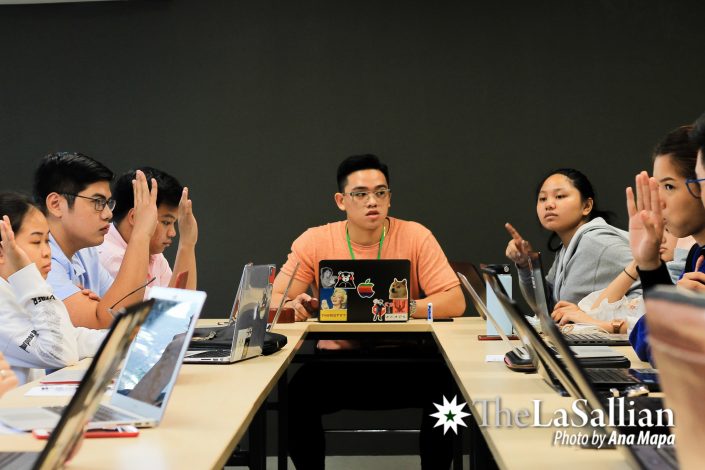The Legislative Assembly (LA) finalized the amendments to the current University Student Government (USG) Constitution in the USG Session Hall last November 8.
This marked the third consecutive time—and fourth overall—that the LA deliberated on the matter, which has continuously been on the floor since October 25, though it was first discussed the week prior.
However, per the USG charter, the amendments shall only become valid once ratified by a majority vote in a plebiscite.
Instating the Ombudsman
Provisions for the establishment of the Office of the Ombudsman were also finally passed by the LA, culminating years’ worth of efforts to formally institutionalize it under the USG Constitution. The body was ordered by the legislature to cease operations in 2014 for supposed discrepancies in its founding, particularly for not being stipulated under the student government charter.
The vote to officially instate the office came after deliberations on whether it should be a constitutional commission, as Minority Floor Leader Neal Gonzales originally intended. BLAZE2020 LA Representative Urban Teh pointed to the Philippines’ own Ombudsman office, explaining, “[The Ombudsman office’s website] actually states that the [Office of the] Ombudsman is a constitutional commission in itself because their officers are appointed, not elected.”
Looking into the 1987 Philippine Constitution, however, reveals that such office stands as an independent body and not as a constitutional commission.
Majority Floor Leader Maegan Ragudo questioned Gonzales’ original proposal, reasoning that the USG Ombudsman office should not be a constitutional commission because “a constitutional commission requires congressional oversight or congressional appointment.” According to her, this is not recommended because it allows the LA to have influence over the office’s procedure manuals.

After EXCEL2021 LA Representative Anna Katrina Ignacio clarified that the country’s Ombudsman office is not one of the constitutional commissions per the Philippine constitution, Gonzales resolved to instead propose that a separate article be dedicated to establishing the USG’s Ombudsman as an autonomous body.
The decision fulfills a 2018 LA legislation, dubbed the Ombudsman Act, which called to include in the USG charter provisions on the said office. But plans on how to re-establish the ombud body were already formulated as early as 2016.
Reviewing the articles for impeachment
In pursuit of accountability, one of the amendments made to the current USG Constitution concerns the ability to impeach appointed and elected officers. Previously, the Constitution only required two-thirds of magistrates to be present to vote on an impeachment hearing. The amendment now requires all magistrates to be present.
Only in cases of academic matters, representing the University, health concerns, or the death of an immediate family member can a magistrate be given an excused absence, given that they provide a valid excuse letter within the 24-hour gap before the impeachment procedure.
Gonzales argued that although it is important to recognize the importance of the magistrates being complete as they are the decision makers of the impeachment case, there are instances when they cannot attend.
Clarifying roles, responsibilities
Gonzales proposed last October 25 to merge the organizational structure of the Office of the President (OPRES) and the Office of the Vice President for External Affairs (OVPEA), claiming an overlap of responsibilities.
Ragudo objected, saying that the OVPEA implements the projects and programs related to the external affairs of the University, whereas the external affairs function of the OPRES is limited to representing the student body.
Teh reiterated the need for more autonomy for batch units and college governments. “Minsan hindi kasi aligned ‘yung projects na gusto ng batch unit sa vision ng EB. The batch unit gets the more specific problems of their batchmates,” he rationalized.
(There are times when the batch units have projects that are not aligned with the vision of the EB.)
Ragudo countered, however, that the USG is an autonomous body already, and it would not make sense to create more gaps between the units.
The body also affirmed Gonzales’ proposal to change the title of LA Representative into Batch Legislator for those from the Manila campus and Campus Legislator for those from the Laguna Campus, following his rationale that a name change would make the position “more understandable [for] the students.”
Restructuring the LCSG
Also among the LA’s decisions was to approve changes to the charter of the Laguna Campus Student Government (LCSG).
LCSG LA Representative Michelle Gelvoleo deemed the constitution of her student government “really outdated”, having been promulgated in 2017. Among her concerns was the inclusion of LA representatives, which she pointed out are legislative positions, in their Executive Board (EB). To resolve this, Gelvoleo adopted an earlier proposal by her predecessor, Geo Olaivar, and suggested to add new positions to the LCSG EB, while removing the LA solons as members.
She also moved to increase the number of LA representatives from the campus. “We are a growing population, and it would be hard for two [LA] representatives to address the problems of the four colleges [in the Laguna campus]—and next year six [colleges] na,” she explained.
Gelvoleo thus pushed to make the number of collegiate representatives dependent on the number of colleges in the campus and to add a Judiciary branch with one appointed magistrate. She also relayed that the LCSG opted to have their constitution integrated into the USG’s to unify the two campuses.
With the passing of the resolution, the LA restructured the campus governing body through these changes.
